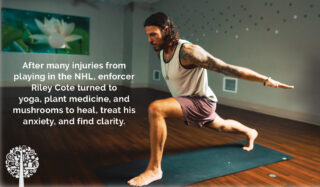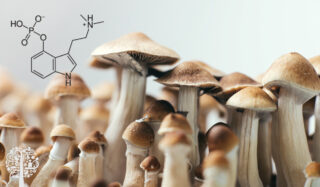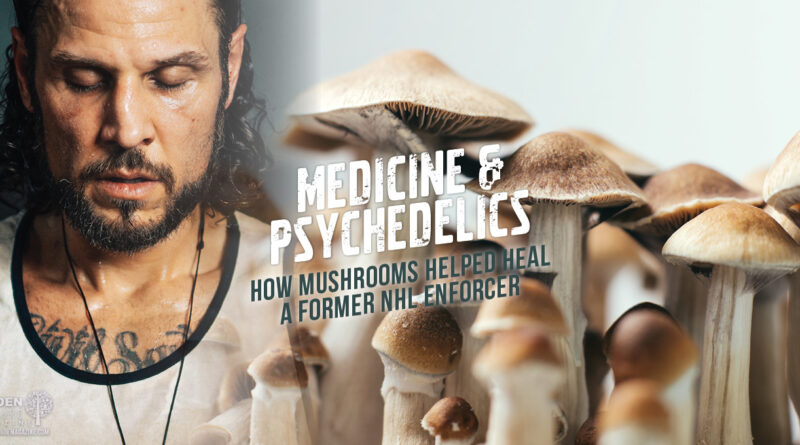Moments Of Clarity: How Mushrooms Helped Heal A Former NHL Enforcer
We’ve all experienced moments of clarity in life, times where, personally or professionally, we finally take a second and realize that things can’t continue at the same rate. For Riley Cote, that moment of clarity came after a fierce fight with Donald Brashear, arguably one of the toughest guys to ever play in the National Hockey League.
“The whistle went, and I knew it was going to happen,” Cote recalls. “I was in the corner, and he was coming from the net, and I got in a bad spot up against the glass. He’s a lefty, and he just starts pounding away. Normally I’d fall over, but I got caught up against [the glass]. I probably took two or three more shots than I should have.”
Cote himself is no stranger to toughness and joins the ranks of Brashear and fellow hockey tough guy Georges Laraque. As a young player, he aspired to be in the NHL and quickly learned that he needed to define himself to stay in the league. So Cote took on the role of an enforcer, battling his way through 60-minute games. He played eight years of pro hockey, four with the Philadelphia Flyers, racking up 411 penalty minutes and engaging in 50 fights. So the moment he and Brashear dropped their gloves that night in Philly wasn’t unexpected, but he describes that fight as a turning point in his life. Cote played the rest of the game, only realizing the following day in the shower how badly he’d been hurt.
“I blew my nose, and all of a sudden, I felt like a balloon behind my eye instantly swell up, and my eye sealed shut. And I’m like, ‘what did I do?’”
The team’s medical trainers and a doctor determined Cote had a cracked sinus. Despite also likely suffering a concussion, Cote boarded the team bus to play the next game.
“The whole bus ride to New Jersey the next day, I was like, ‘what am I doing? This is not very fun anymore,’” he says.
Cote initially enjoyed his NHL gig a lot, but the novelty wore off as the seasons went on. Throughout his career, Cote tells me he suffered many injuries, many of which he still feels the effects of today. He’s had multiple surgeries to repair his knees, wrist, nose, and eyes. Along with several diagnosed concussions, he knows there were also more than a few undiagnosed ones. He rolled with the punches, so to speak, and rehabbed through it all. But after his fight with Brashear, he began to understand the negative impact his enforcer role had on him. So he played one more season, finally deciding to hang up his skates in 2010.
“It just wears on you,” he explains. “It’s this chronic state of anxiety. It’s fight or flight, and you’re in the middle, unsure when the fight will happen. So it took its toll, for sure.”
Banging The Drum
After retiring from pro hockey, Cote says he felt emotionally and spiritually drained; he suffered from depression and an alcohol dependency. Whether it was too many concussions or simply his state of mind, Cote knew that something had to change. So he began looking for ways to self-heal using plant-based medicines instead of prescription drugs.
Cote had a long-standing relationship with cannabis; he’d used it throughout his career to recover and improve his performance. But he admits he’s never used it mindfully until after he retired from the NHL. He knew it made him feel better but only began appreciating the plant’s medicinal and therapeutic benefits after extensive post-hockey research.
He says he started banging the drum early for North American standards, hosting a small music festival in Philadelphia in 2011 called The Hemp Heals Music Festival. The goal was to help raise awareness about the hemp plant and its many nutritional, medicinal, and industrial uses.
After taking so many hits to the head throughout his hockey career, Cote’s priority was brain health. So he started researching psilocybin and mushrooms, including their neuroregeneration and neuroprotective properties. Little did he know that he was about to embark on a life-changing journey that would help his brain and lead him to discover a new identity, one focused on self-love and holistic healing.
“Much like cannabis, I started using these other plant medicines and mushrooms to help with my concussion-related issues, my depression, my substance abuse stuff,” he says. “Ultimately, I found it was helping me transition into the real world and shed the old Riley; shed the skin of this identity I was carrying and detach from that so [I could] recreate and find myself.”
A New Identity

And recreate himself he did. Cote transformed from an NHL tough guy to an advocate for natural medicines and those seeking purpose. He is the founder of the Hemp Heals Foundation, a non-profit that helps people boost their quality of life using hemp and cannabis products. He co-founded Athletes For Care, an organization dedicated to helping athletes find themselves and opportunities after their pro careers end. He has spent years diligently studying plant medicine, mindfulness, and yoga. As a co-founder of Bodycheck Wellness, Cote promotes non-toxic, plant-based pain management and self-healing treatments. His company specializes in organically grown, hemp-derived CBD extracts and mushroom blends that reduce inflammation and recovery time, optimizing everyday performance. He speaks openly about his experience with mushrooms and how they’ve helped him close chapters from his past and be more present and productive. Cote says finding that sense of calm, peace, and self-respect was simultaneous with his decision to approach using mushrooms with intention.
“I felt it instantly. I felt […] these ‘aha’ moments and these insights,” he explains. “This space it creates of letting go of things you’re attached to. Not material things, but ideas and stories you’ve told yourself about who you think you were.”
Magic Mushroom Ceremonies
Cote is adamant that approaching psilocybin with intention differs significantly from using mushrooms recreationally. Unlike in a party setting where many things can go wrong, Cote refers to ‘Magic Mushroom Ceremonies,’ during which participants are offered a safe space for the experience under the guidance of a ceremonial leader. No outside distractions can potentially cause anxiety and influence the ‘trip.’ The resulting meditative state lasts about five hours, and Cote says the mushrooms will show you what you need to see during that time. He describes intense moments of healing, forgiveness, and self-awareness. He talks about ditching the chronic state of anxiety and letting past trauma go, emerging from the experience satisfied with how life unfolds.

“There’s more freedom,” he explains. “You’re able to see the world more clearly and navigate more skilfully, and without knowing what the future looks like, you’re okay with how [everything] is.”
The mushroom retreats take place where psychedelics are legal, like in Jamaica. While the ceremonies are essentially a spiritual experience leading to deep emotional healing, the physical benefits can’t be ignored. Cote equates it to yoga, where a physical release often leads to emotional calm. He believes that by letting go of the psychological things that bog us down and interfere with spiritual growth, our bodies move and function better.
“Your body feels a little more spacious,” he explains, “and I think it’s because you’re carrying around less stress. Your nervous system is a little more regulated. So, therefore, you feel more spacious versus more tense.”
Of course, life isn’t miraculously perfect after an experience with psilocybin, as we constantly have to work on our psyches. But Cote says the mushrooms give you enough at that moment to continue forward on your journey of healing.
A Love For Plants
In speaking with Cote, you can see and feel his appreciation and love for plant-based medicine, yet, he is never pushy about experimenting with psychedelics. He understands many people are hesitant, so his role is to be present and helpful to anyone curious about trying mushrooms as medicine. He says people contact him regularly, wanting to learn more about how psilocybin might be able to help them. He’s introduced fellow NHL alumni Steve Downie and Daniel Carcillo to psilocybin. Psychedelics positively impacted Carcillo, who suffered the mental and physical effects of too many concussions and slipped into a deep depression after his career ended. He has since started his own psilocybin company to help others with traumatic brain injuries.
But Cote connects with more than former and fellow athletes; he’s worked extensively with war veterans, who, like many athletes, have difficulty finding their identities after leaving service. He says psychedelic medicines extend beyond head trauma and PTSD, so you don’t have to be an ex-athlete or soldier to benefit. Psychedelics can also help those suffering from depression and anxiety, allowing them to let go of the past and live in the present moment. Cote describes psilocybin as a conscious-forming fungus that helps create awareness and draw attention to daily behaviors and thought patterns. The result is a slower pace that allows people to work on themselves and be better humans, no matter their situation.
“I honestly believe that everybody needs this,” he says. “Everybody could use [psychedelic medicine] in some way, shape, or form. Because we all have our own issues that we can make sense of; we’re all carrying some trauma whether we think we are or not.”
The Future Of Psilocybin
Several ongoing studies are looking at psilocybin’s effects as an anti-inflammatory on the brain. Cote hopes we can learn from our past to improve our futures. After all, psychedelics were used in ancient civilizations during spiritual healing practices. Cote equates his experience using plant-based medicines to our ancestors passing the baton and teaching us how to be spiritual beings again.
Slowly but surely, people are again noticing the psychedelic space. In November 2022, voters in Colorado legalized psilocybin for anyone aged 21 and up, the second state to do so after Oregon. While it will be years before Colorado’s legal framework for psychedelic drugs is up and running, supporters of plant-based medicines view it as a massive step in the right direction. In his current line of work, Cote says it’s evident that people are desperate for something different from what the current health model offers.
“I think the psychedelic space is going to help truly reform what medicine is and how people heal,” he says. “To me, we’ve taken the spirit out of healing and bastardized it. We’ve made it one-dimensional, single-molecule pharmaceutical drugs. We medicate the shit out of people. There’s no getting to the root cause of any of this stuff. We just suppress it; we just bury it.”
Cote emphasizes that using psilocybin or cannabis as medicine isn’t about getting high; like prescription drugs, many people have also bastardized plants. He uses the cultivation of various strains of cannabis with ridiculously high THC levels as an example. Instead, he believes the way forward is to use plant medicine with intention and integrity. We can apply this same philosophy to our daily lives, supporting local farmers, cultivators, and breweries, practicing mindfulness, being kind, and tapping into deeper spiritual and physical energies. Some may say that’s all too granola, but Cote describes it as exciting.
“It’s an amazing time to be alive,” he says. “There’s this renaissance of awakening happening through plant medicine, sacred plant medicine, and consciousness.”
Is the world ready for it? Only time will tell. But Cote is patiently waiting, ready to help others find those moments of clarity, peace, happiness, and appreciation for the present moment and everything plants provide.
For more information, check out rileycote.com and bodychekwellness.com




